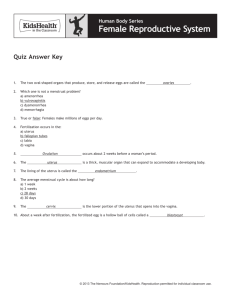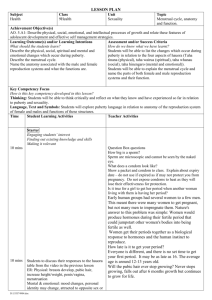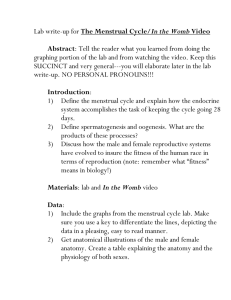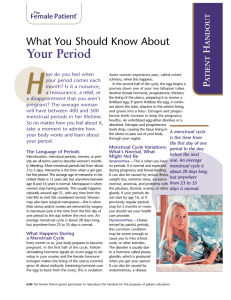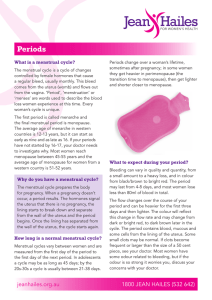FAQ049 -- Your First Period (Especially for Teens)
advertisement
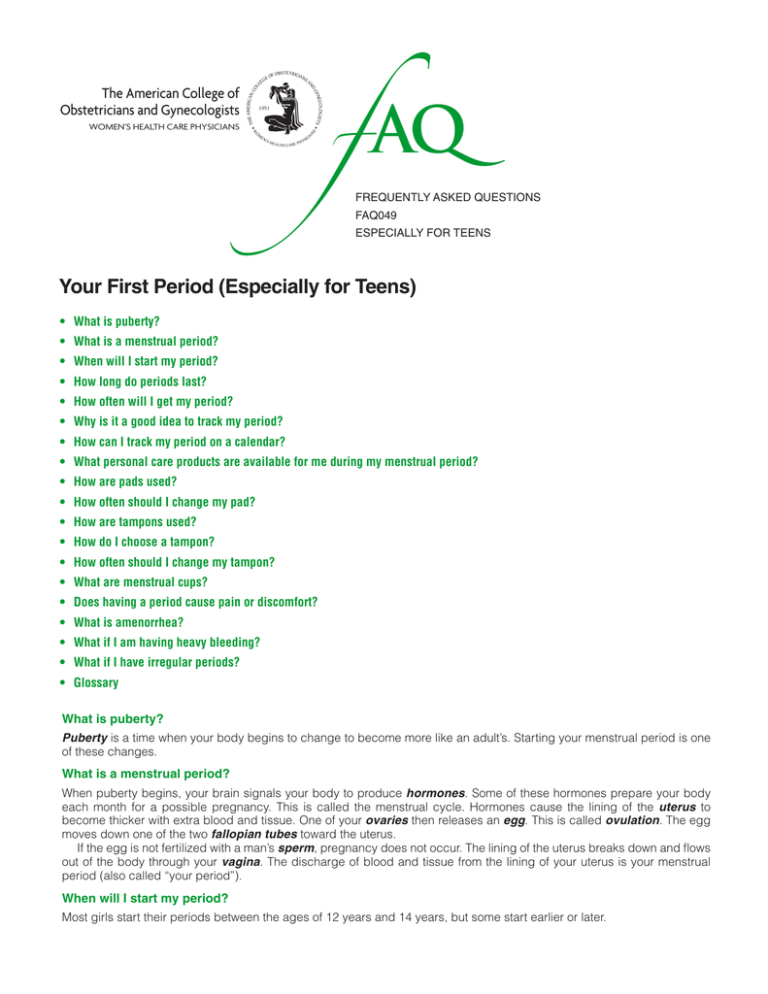
f AQ FREQUENTLY ASKED QUESTIONS FAQ049 ESPECIALLY FOR TEENS Your First Period (Especially for Teens) • What is puberty? • What is a menstrual period? • When will I start my period? • How long do periods last? • How often will I get my period? • Why is it a good idea to track my period? • How can I track my period on a calendar? • What personal care products are available for me during my menstrual period? • How are pads used? • How often should I change my pad? • How are tampons used? • How do I choose a tampon? • How often should I change my tampon? • What are menstrual cups? • Does having a period cause pain or discomfort? • What is amenorrhea? • What if I am having heavy bleeding? • What if I have irregular periods? •Glossary What is puberty? Puberty is a time when your body begins to change to become more like an adult’s. Starting your menstrual period is one of these changes. What is a menstrual period? When puberty begins, your brain signals your body to produce hormones. Some of these hormones prepare your body each month for a possible pregnancy. This is called the menstrual cycle. Hormones cause the lining of the uterus to become thicker with extra blood and tissue. One of your ovaries then releases an egg. This is called ovulation. The egg moves down one of the two fallopian tubes toward the uterus. If the egg is not fertilized with a man’s sperm, pregnancy does not occur. The lining of the uterus breaks down and flows out of the body through your vagina. The discharge of blood and tissue from the lining of your uterus is your menstrual period (also called “your period”). When will I start my period? Most girls start their periods between the ages of 12 years and 14 years, but some start earlier or later. How long do periods last? When you first start having your period, it may last only a few days. Your first few periods may be very light. You may only see a few spots of reddish brown blood. Anywhere from 2 to 7 days is normal. How often will I get my period? A menstrual cycle is counted from the first day of bleeding in one month to the first day of bleeding in the next month. The average menstrual cycle is about 28 days, but cycles that are 21–45 days also are normal. It may take 6 years or more after your period starts for your cycle to get regular. Why is it a good idea to track my period? If you do this every month, you may notice a pattern. It may become easier to tell when you will get your next period. Check online or on your smart phone for apps that can help you track your period. How can I track my period on a calendar? To track your period on a calendar, mark the first day your bleeding starts on a calendar with an “X.” Put an X on each of the following days that you have bleeding. Count the first “X” as day 1. Keep counting the days until you have your next period. What personal care products are available for me during my menstrual period? Pads are used to soak up the menstrual flow. Tampons and menstrual cups catch the flow from inside your vagina. Pads, tampons, and menstrual cups can be used at different times. Some also can be used together. How are pads used? Pads are worn inside your underwear to collect your menstrual flow. They come in different sizes, styles, and thicknesses. Some have extra material on the sides called “wings” that fold over the edges of your underwear to help keep the pad in place and give better protection. A thinner, shorter version of a pad is a “panty liner.” Some girls wear panty liners on the last days of their periods when the flow is light or on days when they think their periods will come. How often should I change my pad? Change your pad at least every 4–8 hours or whenever it seems full or feels wet and uncomfortable. Some girls change their pads each time they urinate. How are tampons used? Some tampons have a plastic or cardboard applicator tube that helps slide the tampon in place. Some tampons do not have applicators and are inserted with just your fingers. A short string attached to the end of the tampon hangs out of your vagina to help you remove it later. How do I choose a tampon? Just like pads, tampons come in different sizes for heavier and lighter periods. The tampon package will tell you how much fluid it will absorb. A “super” tampon, for example, is thicker and is meant for heavy flow. A “slim” or “junior” tampon is slender and is meant for lighter flow. How often should I change my tampon? You should change your tampon at least every 4–8 hours. Leaving a tampon in for a long time has been linked to toxic shock syndrome. When your flow is heavier, you may need to change it more often. What are menstrual cups? Menstrual cups are made of plastic or rubber. They are inserted into the vagina to catch the menstrual flow. You remove and empty the cup every 8–12 hours. Some cups are used only once and thrown away. Others can be washed and reused. Does having a period cause pain or discomfort? Some girls have a cramping pain in the lower abdomen or back or breast tenderness just before and during their periods. Some girls get headaches or feel dizzy. Some get nausea or diarrhea. To help ease cramps, you can try the following: • Take ibuprofen or naproxen sodium (if you do not have an allergy to aspirin or severe asthma). Always follow the directions on the bottle about how much to take. •Exercise. • Place a heating pad, heat wrap, or other source of heat on your abdomen or lower back. What is amenorrhea? Amenorrhea means not having a period. It is normal for some girls not to start their periods until age 16 years. However, your doctor may want to see you if you have not started by age 15 years. You also should see your doctor if you have started your period but it then stops for more than 3 months. What if I am having heavy bleeding? If you are bleeding so much that you need to change your pad or tampon every 1–2 hours or if your period lasts for more than 7 days, you should see your doctor. See your doctor right away if you are light-headed, dizzy, or have a racing pulse. What if I have irregular periods? You should tell your doctor if your periods are usually regular but then become irregular for several months. You also should see your doctor if your period comes more often than every 21 days or less often than every 45 days. Glossary Amenorrhea: The absence of menstrual periods. Egg: The female reproductive cell produced in and released from the ovaries; also called the ovum. Fallopian Tubes: Tubes through which an egg travels from the ovary to the uterus. Hormones: Substances produced by the body to control the functions of various organs. Ovaries: Two glands, located on either side of the uterus, that contain the eggs released at ovulation and that produce hormones. Ovulation: The release of an egg from one of the ovaries. Puberty: The stage of life when the reproductive organs become functional and secondary sex characteristics develop. Sperm: A male cell produced in the male testes that can fertilize a female egg. Toxic Shock Syndrome: A severe illness caused by a bacterial infection. Uterus: A muscular organ located in the female pelvis that contains and nourishes the developing fetus during pregnancy. Vagina: A tube-like structure surrounded by muscles leading from the uterus to the outside of the body. If you have further questions, contact your obstetrician–gynecologist. FAQ049: Designed as an aid to patients, this document sets forth current information and opinions related to women’s health. The information does not dictate an exclusive course of treatment or procedure to be followed and should not be construed as excluding other acceptable methods of practice. Variations, taking into account the needs of the individual patient, resources, and limitations unique to the institution or type of practice, may be appropriate. Copyright May 2015 by the American College of Obstetricians and Gynecologists.
